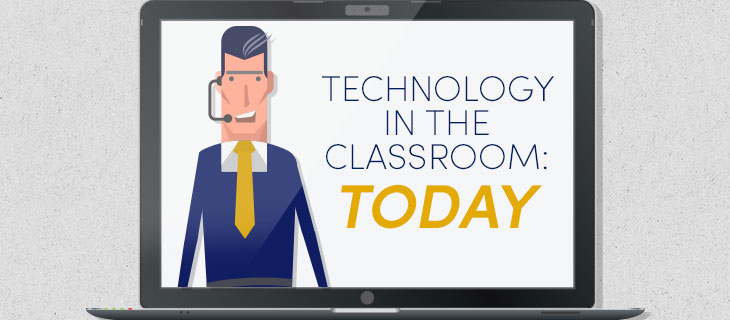
Technology is a constant presence in the modern classroom. From smartboards to iPads, teachers are integrating new devices into their lesson plans every day. Today’s education landscape features a wide variety of tools to help students learn. A conscious effort has been made by many school systems to adopt the newest technology, and students aren’t fazed: They are already avid users of technology outside of the classroom in their daily lives. It is the responsibility of teachers and education experts to prepare students for the real world through the opportunities that classroom technology creates. Though there have been countless innovations through the years, the following tech devices and tech-based education methods play particularly significant roles in the modern classroom.
- Smartboards: You will still find chalkboards in classrooms across the country, but they are rapidly being replaced with interactive digital screens known as smartboards. When they were initially introduced in 2005, the first smartboards were used in about 150,000 classrooms. Now, more than 2 million classrooms use these interactive whiteboards. That number equates to around 60 percent of all classrooms in the country. Some of the benefits of smartboards include their ability to save teachers’ notes and any other information written on the board. Teachers can then send the information to students via email or a classroom social media account. Smartboards also make showing instructional and educational videos much easier, without having to set up a TV, projector screen or another, separate device.
- Remote learning: The snow days that students have enjoyed for decades are becoming a thing of the past, thanks to online learning. Schools are able to greatly reduce, if not completely eliminate, snow days from their calendars due to technological advancements. Instead of having the day off due to inclement weather and dangerous commutes, students are tasked with following lessons online. Coursework is offered online; however, students are still able to interact with their peers via video conferencing, private chat rooms and direct video calls.
- E-books: Digital textbooks are growing in popularity, with companies like Pearson, Amazon and CourseSmart offering e-books as a more cost-effective, mobile option than printed textbooks. These digital textbooks allow students to take notes, highlight, save passages and search. Many options from Apple iBook and Discovery Education are introducing “techbooks” that are interactive and can be personalized for each student. Language and text size are just some of the ways that e-books can be made easier to use.
- Computer-based testing: Scantron machines, though still in use, are slowly being phased out in today’s classrooms. Instead, exams are delivered digitally via personal computers, laptops and other devices. In particular, exams associated with the Common Core State Standards are administered on computers and tablets in 29 states and the District of Columbia. However, there have been hiccups with this approach, such as server issues.
While innovations like these are certainly changing the delivery of schoolwork, it is important to note that teachers will always play a vital role in the classroom. As companies introduce new devices and market them to school systems, all of the technology serves one purpose: to enhance and support what educators have done for centuries. When teachers understand and use technology effectively, both students and the education system as a whole can achieve new levels of success.
Teacher Education at King University
Continued education is an effective way for teachers to keep pace with changes and tech innovations. Educators can rely on King University’s Master of Education in Teacher Leaders program to provide a relevant, specialized education that enables them to be leaders both in the classroom and beyond. This online degree program focuses on expanding the leadership potential of teaching professionals, allowing them to become subject matter experts and mentor their fellow educators. You can learn more about King University’s online Master of Education program here.